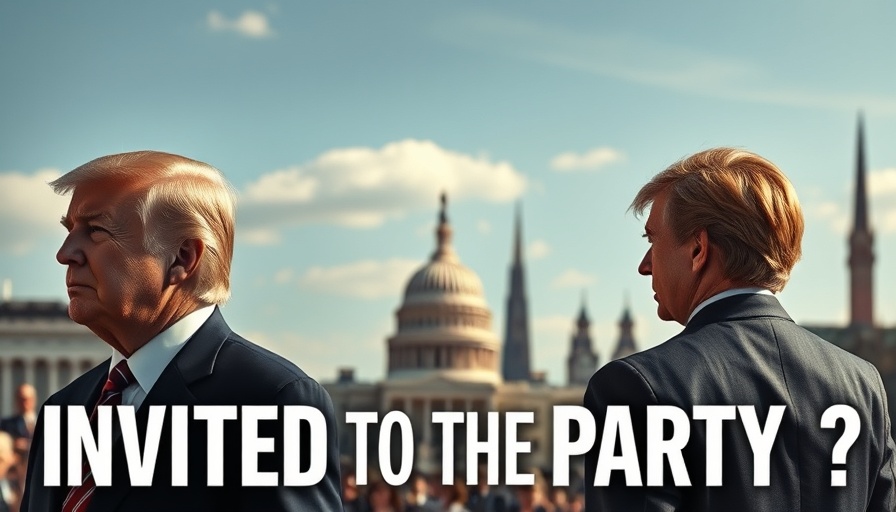
The Potential Shake-Up in Political Landscapes
In a world increasingly polarized by partisan lines, the prospect of a new political party—especially one spearheaded by figures like Elon Musk or Jeremy Corbyn—invites both fascination and skepticism. This discussion, brought to light in the recent video, Is There Room for ANOTHER Political Party? | Elon Musk & Jeremy Corbyn Think So., poses pivotal questions about the efficacy and impact of third-party movements on existing political structures in the UK and America.
In the video Is There Room for ANOTHER Political Party?, the dialogue centers around the potential for new political movements to emerge in a polarized landscape, prompting us to analyze the implications on voter sentiment and systemic change.
Understanding the Political Environment
Currently, both the US and UK political spheres appear entrenched and divided, often leaving citizens disillusioned. Elon Musk’s rumored plans for an “America party” and Jeremy Corbyn’s efforts recall past attempts that sought to challenge the two-party status quo, yet historical precedents suggest that such ventures often struggle to yield substantial change. The two-party system in America is particularly daunting, characterized by a strong reliance on funding and tribal voting patterns that frequently stifle independent alternatives.
Breaking Down the Influence of Money in Politics
The discussion touches on a critical theme: the role of financial resources in shaping political outcomes. Musk, with his immense wealth, certainly has the capacity to throw financial support behind any political initiative. Yet, as highlighted in the transcript, his lack of political acumen raises eyebrows. Critics argue that mere funding is insufficient without substantive political ideologies or community connection. Historical figures who attempted to launch political parties, such as Ross Perot, faced similar challenges, often getting lost in the political wilderness despite initial popularity.
Why New Parties Risk Splitting Votes
A particularly salient point raised in the discourse is the concern that new parties will fragment existing voter bases—that a Corbyn or a Musk-backed party could dilute left-leaning votes, inadvertently paving the way for more right-wing candidates to gain traction. This question of vote-splitting is not merely speculative; historical patterns throughout both the US and UK political landscapes illustrate how indecisive strategic maneuvers disproportionately favor entrenched parties.
The Role of Public Sentiment and Community Needs
For any new political party to resonate and gain traction, understanding public sentiment is key. The challenges surrounding economic inequality and pressing social issues, such as child poverty, job stability, and welfare, require leaders to directly engage with constituents' concerns. A political narrative devoid of concrete answers related to these pressing matters will likely fall flat, regardless of how charismatic or influential the leader may be.
Future Possibilities: A Center Ground?
Amid such complexity, some voices argue for a more centrist party that can cut across traditional lines and reconnect voters with actionable policies aimed at improving economic conditions. This is not merely wishful thinking; it’s a potential response to the burgeoning dissatisfaction felt by many who cling to neither the Republicans nor the Democrats in the US, nor the Conservative and Labour parties in the UK. A party that operates beyond the entrenched ideologies of the past may articulate the needs of the electorate more effectively.
The futility of merely replicating existing party ideals under a new banner was underscored in the conversation, suggesting that while the desire for fresh political entities exists, the intellectual and ideational framework to support these movements remains elusive. As the discussion has elucidated, this is an ongoing riddle for political aspirants and citizens alike.
Final Observations: What Lies Ahead
The recent analysis serves to remind us that while change is undoubtedly necessary in both the US and UK politics, articulating a clear vision, alongside the ability to address pressing social issues, is fundamental for the success of any new political party. As voters continue to navigate a landscape shaped by economic uncertainty and societal unrest, the thirst for revolutionary ideas and champions capable of executing meaningful change remains potent.
If you're keen on exploring more insightful discussions or want to join a platform that amplifies your voice, consider jumping into platforms like Fuse Energy, which encourages proactive engagements in politics while offering excellent savings on energy tariffs. A little investment in understanding and participating in political discourse today can lead to meaningful changes tomorrow.
In conclusion, the emerging discussions surrounding potential new political movements, while provocative, underline the complexities inherent in attempting to shift entrenched political paradigms. The need for new ideas is apparent; however, whether these ideas can synthesize into a coherent alternative remains to be seen.
 Add Row
Add Row  Add
Add 




Write A Comment